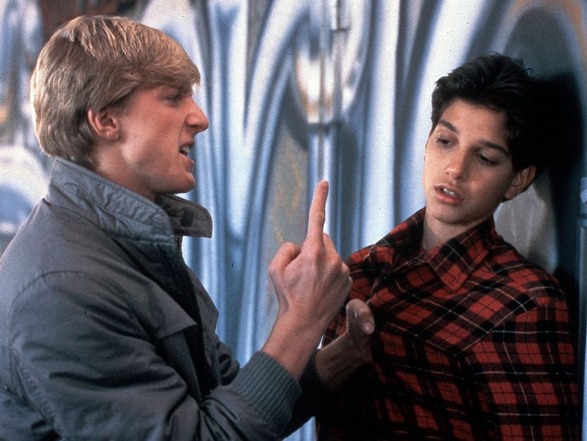An oppressive atmosphere loomed over the Thanksgiving table. Heavy silence held, broken only by the shifting of Pyrex and the transfer of food to plates. Moments before words and gestures befitting a warzone had rained down from all sides. Now, menacing glances unbefitting of a family flew silently across the feast like bullets, each venomous glare adding another layer of tension.
I asked my father what caused such immense rage, he said it was just the aftermath of a “debate”, a word my nine-year-old self had never heard. Like many, my introduction to the word was a fight, followed by seething silence that damaged the relationships between family members for years to come. To me, debate and fight were synonymous, and this notion is perpetrated by modern culture. Debates are something to be won, the goal is to “own your opponent with facts and logic”, and then people wonder why no one wants to debate. They are traps rather than discussions.
Debates shouldn’t be something to be won. Making a fool of your opponent makes future debates less likely. As someone who has debated and won trophies for West Ottawa, these are a few things I like to keep in mind while preparing for debate.
Real debates are a battleground of ideas, not of people and for debate to continue, respect and courtesy should be shown by both sides, regardless of the issue. If you can’t keep your emotions in check long enough for a civil conversation, you need to grow up. It’s fine to be passionate, but spitting insults at your opponent is childish and will nullify any points you make in a debate.
Don’t take criticism of your ideas personally. If your beliefs can’t take criticism, they are flimsy, and crying about them makes you look more insecure. For a debate to be productive, you need to be willing to take criticism of your ideas. Don’t take it as an insult, but as a chance to grow.
Keep an open mind. Just because your ideas are challenged doesn’t mean you should filter out your opponent’s points. Learning from debates and growing your ideas is great because no matter how pure your intentions, your ideas are flawed. Debates should be looked at as a test of the strength of your ideas and finding common ground with someone you disagree with, so you can find a compromise that satisfies you both. You also need to be willing to admit when you are wrong, not everything you say is correct, and acknowledging that will help bridge the gap.
Just because someone you like on the news says something doesn’t mean it’s true or moral. You can’t rely on the argument that “someone smart said it”, you need to substantiate your ideas with research. Read studies, fact-check articles, and get to know the other side. You can’t agree or disagree if you don’t know the other side’s arguments
When researching, don’t settle for a clip, a headline, or even the abstract of a study. Clips can be taken out of context. Media outlets often put scandalous libel in their headlines, and give the real story at the end of the article to avoid being sued. The purpose of an abstract is to briefly explain the study, meaning a lot of information is left out. Being well-researched leads to well-rounded, grounded arguments and opinions.
Not all evidence is created equal. Familiarize yourself with different evidence, such as the difference between empirical data and anecdotal stories, and always check your opposition’s sources. Arguments like “my neighbor said this”, while not meaningless, is not as meaningful as a full study. Be as transparent as possible about your sources, show you have nothing to hide.
Be aware of logical fallacies. When getting into a debate, many abandon arguing their opinions and instead fall back on tricks of the tongue. Common fallacies are personal attacks (ad hominem), attacking an argument you didn’t make (strawman), and relying on credentials without actually saying anything (appeal to authority), but there are many more to be wary of. These tactics are designed to get you riled up during a debate or make your opposition look smarter than they are. They are used all the time in public debate, and are so successful because of their deceptive nature. Not tripping up on these non-arguments will help strengthen your debating skills.
If you don’t want to talk about an issue or feel you aren’t well enough prepared, you don’t need to. A popular tactic in debates is to debate someone in an unfavorable situation, either by having a numbers advantage or challenging someone on an issue they are not experienced enough in. TV shows such as The View or Doctors are guilty of using numbers and an aggressive attitude to intimidate their opposition. Don’t get sucked into a debate you don’t want to have.
Getting aggressive is an instant loss in any form of debate. Yelling, name-calling, or even getting physical all show your opposition that they are getting to you, and in a public setting, show that you can’t control your emotions. Keep calm and let the opposition’s actions speak for themselves. If your opposition is just insulting you, call them out respectfully. If calling them out does nothing, you are no longer having a debate, and thus you shouldn’t participate further.
As cliche as it sounds, separate your facts from feelings. Debate-bro culture is dumb, but it makes a valid point here. Figure out how much of your opinion is based on emotion, and work to reduce it. Being passionate about something is natural, but that passion should be a stepping stone to researching further, rather than the argument itself. If you can’t divorce your feelings from fact, that’s fine. Not everyone needs to debate about everything.
Acknowledging your bias goes a long way to making a debate more honest. If you’re walking into a debate with an agenda informed solely by past experiences or to further your interests, you shouldn’t discuss that topic. No one is without bias, and you shouldn’t be expected to silence your opinions just because you are biased. Bias doesn’t disqualify you from making good arguments, only when bias crosses over into prejudice does reason fall from informative to a tool for proving bias. If you are prejudiced, learn to be objective with your arguments before debating.
The key to a good debate is to be the better person. Don’t lie, don’t name call, be honest with yourself, research, and be open to change. Your actions are your own, and that should be reflected in debate.








Christopher Norton • Sep 20, 2024 at 2:25 pm
Thanks for sharing. Best line is: “Debate-bro culture is dumb,” Jacob your observations are why you debate so well and have success. Thank you for clarifying what debate is, as to what it is perceived to be.